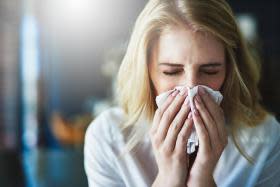Flu or cold? How to tell the difference
It can be easy to conflate the common cold with the more serious flu when we're hiding under a duvet feeling worse for wear. But how can we actually tell the difference between the two?
While colds and flus share several symptoms, there are clear ways of differentiating between the two - and this can be vital when deciding how to treat them.
From prevention to cure, here’s everything you need to know about distinguishing between the prevalent winter illnesses.
Prevention
Colds spread extremely easily, especially when you spend a lot of time in close proximity with other people. This can be particularly relevant when you work in an open-plan office surrounded by people, or take public transport to work.
Germs that are spread from coughs or sneezes can survive for up to 24 hours, which is why taking some simple precautionary measures could do you and those around you a whole lot of good.
The NHS recommends that you wash your hands with warm water and soap regularly and avoid sharing items such as towels or cups with people who may be infected.
Read more
What foods and vitamins can be used to relieve cold symptoms
If you’re in the early stages of a cold, make sure you use tissues when you cough or sneeze and then discard them in a bin as soon as possible. Also wash your hands regularly to avoid spreading the germs.
To safeguard yourself from the flu, Vicks advises that you boost your immune system by sticking to a regular bedtime and keeping yourself fit and healthy.
Due to the unpredictable nature of the flu, having the flu jab is also a wise course of action if you’re particularly vulnerable. This refers to people who are over 65, pregnant or have a serious health condition.
Symptoms
So how do you tell the difference between cold and flu symptoms?
Both are respiratory illnesses with very similar symptoms. However, these symptoms can appear more severe if you’re suffering from the flu.
The first sign of a cold is typically a sore throat, as stated by WebMD. This will often wear off after a day or two, only to be followed by a runny nose and slight congestion of the sinuses.
Read more
Hangover cure myths debunked and how best to rally after a heavy night
You may then develop a cough on the fourth of fifth day, with children more likely to also experience a fever.
The symptoms of flu run pretty much along the same lines, although they may be more acute and materialise rapidly. However, additional symptoms that people may also experience when suffering from the flu include a fever, headaches, achey muscles and soreness.
Further symptoms of swine flu include vomiting and diarrhoea.
Longevity
While no one enjoys having to put up with a cold, symptoms don’t usually last longer than a week or so, according to WebMD.
However, if your symptoms continue to cause havoc after a week, you may be suffering from a bacterial infection.
As long as you have any symptoms of a cold, whether it’s the slightest cough or occasional sneeze, you still pose the risk of infecting others with the virus.
If you have the flu, your symptoms may start to abate after a week, although the NHS has informed that you might still feel weakened for a longer period of time.
While you may make a full recovery in the space of a week or two, catching the flu could lead to a variety of other health problems, especially if you’re particularly susceptible to infection.
Consequences
The common cold does not usually lead to other serious health conditions.
However, symptoms of a bacterial infection can sometimes be mistaken for those of a cold, in which case you could be at risk of further illness.
Three bacterial infections that are most prevalent after a person has experienced cold symptoms include acute bronchitis, pneumonia and acute bacterial sinusitis, as stated by Medical News Today.
Read more
Over half of UK workers believe they have caught bug from colleague
People who are suffering from the flu will generally recover within a couple of weeks.
However, those who are classified as being high-risk, namely the elderly, women who are pregnant or individuals with underlying medical conditions, may find themselves more prone to developing severe illnesses following a bout of flu.
While it is unlikely that a cold will manifest into pneumonia, bacterial infections or hospitalisation, this is a greater possibility for those suffering from the flu, as explained by the Centres for Disease Control and Prevention.
Cure
If you catch a cold, you’ll ordinarily be capable of treating yourself with a few simple measures.
The NHS has advised that anyone with a cold has plenty of rest, keeps themselves warm and drinks lots of fluids to avoid dehydration.
You can also buy cough or cold medicines from your local pharmacy to ease your symptoms and ensure your comfort.
Did you know carers can receive a free NHS flu jab at Boots? Hear Claire King tell her story. Protect yourself and those around you, find out more: https://t.co/sFxtYkaHIm pic.twitter.com/0A0jgFi4QW
— Boots (@BootsUK)
The NHS has issued a list of people who are eligible for the free flu vaccine.
The flu jab will provide you with greater protection from the various strains of the flu that spread on an annual basis.
The list includes anyone over the age of 65, pregnant women, individuals with a body mass index over 40, people with serious health conditions and all primary school children.
Read more
Medical students urged to help in hospitals as winter crisis worsens
As with the cold, flu symptoms can often be treated from home by having lots of rest and taking medicine such as paracetamol or ibuprofen to lower your temperature.
According to the NHS, GPs won’t recommend you take antibiotics for flu as contrary to popular belief, they don’t speed up your recovery.
Your local pharmacist can provide you with any additional advice on flu treatment should you need it.
If your symptoms don’t improve after seven days, you should arrange to visit your GP.




